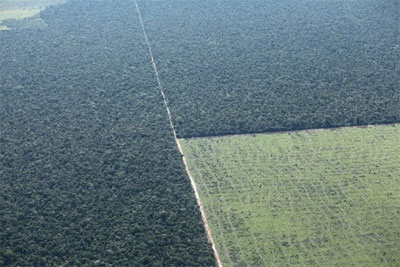Lack of a clear framework and rules for a proposed climate change mitigation mechanism known as Reducing Emissions from Deforestation and Forest Degradation (REDD) could jeopardize its effectiveness and put forest-dependent communities at risk of exploitation, cautions a new report released by an environmental rights policy group.
In “THE END OF THE HINTERLAND: Forests, Conflict and Climate Change”, the Washington-based Rights and Resources Initiative (RRI) warns that without clear rules to address land tenure and forests rights issues, REDD could increase conflict by boosting the perceived value of forest land. Forest communities — which have much to gain under a well-designed and well-implemented mechanism — are particularly at risk.
“Forest lands are booming in value for the production of food, fuel, fiber and now carbon,” write the authors of the report. “While the era of the hinterland is ending, the future of forest areas is not yet clear. There will be unparalleled national and global attention and investment in forests in 2010—but who will drive the agenda and who will make the decisions?”
 Deforestation is a bigger source of emissions than all the world’s cars, trucks, planes, and ships combined. |
The report reviews some of the major questions hanging over REDD, especially those concerning land rights, corruption, governance, finance, and equity of benefits. It asks whether REDD will really reform forest governance, an area that has been long plagued by corruption and mismanagement, and notes that some of the institutions involved in developing REDD have poor records on human rights and the environment. Further, says the report, the lack of a framework on REDD could spur dodgy forest carbon deals. Shady schemes are already proliferating, with cases reported in Indonesia and Papua New Guinea, where landowners are being asked to pay for the right to collect REDD payments. Clearly-defined rules and regulation could help curtail such injustices, but there will remain daunting governance challenges to overcome in order to ensure REDD is just and effective.
“The world is poised in a moment of great opportunity. The actions of communities, advocates and governments in 2010 could result in devastating back-sliding, or provoke great, positive change,” write the authors. “In the lead-up to Copenhagen these groups demonstrated that they have the capacity, willingness and wherewithal to engage in policy at the international level. Now the contest is shifting back to the local and national levels—where the rules and benefits will be sorted.”
THE END OF THE HINTERLAND: Forests, Conflict and Climate Change PDF – 1.6 MB
Related articles
Ethnographic maps built using cutting-edge technology may help Amazon tribes win forest carbon payments

(11/29/2009) A new handbook lays out the methodology for cultural mapping, providing indigenous groups with a powerful tool for defending their land and culture, while enabling them to benefit from some 21st century advancements. Cultural mapping may also facilitate indigenous efforts to win recognition and compensation under a proposed scheme to mitigate climate change through forest conservation. The scheme—known as REDD for reducing emissions from deforestation and degradation—will be a central topic of discussion at next month’s climate talks in Copenhagen, but concerns remain that it could fail to deliver benefits to forest dwellers.
Are we on the brink of saving rainforests?

(07/22/2009) Until now saving rainforests seemed like an impossible mission. But the world is now warming to the idea that a proposed solution to help address climate change could offer a new way to unlock the value of forest without cutting it down.Deep in the Brazilian Amazon, members of the Surui tribe are developing a scheme that will reward them for protecting their rainforest home from encroachment by ranchers and illegal loggers. The project, initiated by the Surui themselves, will bring jobs as park guards and deliver health clinics, computers, and schools that will help youths retain traditional knowledge and cultural ties to the forest. Surprisingly, the states of California, Wisconsin and Illinois may finance the endeavor as part of their climate change mitigation programs.
Indigenous people serve as guardians of forest carbon, must be involved in climate solutions
(04/22/2009) Efforts to create an international climate framework — including a carbon financing mechanism for forest conservation — must involve forest people, said indigenous leaders attending the Indigenous Peoples Global Summit on Climate Change meeting this week in Anchorage, Alaska.